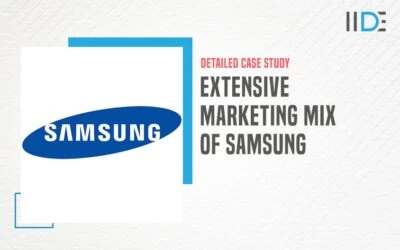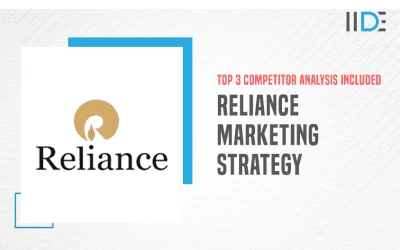In the previous blog, we elaborated on the SWOT analysis of Booking.com. In this article, we’ll discuss the marketing strategy of Booking.com – a Dutch online travel agency for lodging reservations & other travel products.
The main aim is to gain a clear understanding of the marketing strategies of Booking.com and how it became a company having a website that has over 28 million listings.
Booking.com has adopted many digital marketing strategies which help them to develop their marketing strategies.
if you are interested in learning digital marketing then check out the IIDE Free Masterclasses on Digital Marketing which offers an understanding of digital marketing and much more, taught by the CEO and founder of IIDE Karan Shah with his team members.
To know more about Booking.com in a detailed way like how it deals with its consistent growth and amazing performance let us go through the marketing strategy of Booking.com, but before jumping into the Marketing Strategy of Booking.com let’s know more about Booking.com.
About Booking.com – Overview
The travel partner places its client’s memories in 85,000 destinations across the world through its various stay partners and other travel amenities. Booking.com was founded in 1996 in Amsterdam, Netherlands as a tiny Dutch start-up and has since evolved to become the world’s leading digital travel company.
Booking.com’s purpose is to make travelling across the world more accessible to everyone by investing in technology that removes the friction from travel. Booking.com connects millions of visitors to unique experiences, a variety of transportation options, and fantastic places to stay – from houses to hotels and more.
Booking.com, one of the world’s leading online travel services according to market share, has over 28 million reported lodging listings, including over 6.2 million hotels, homes, apartments, and other unique places to stay, and is available in 43 languages. Booking.com makes it simple to go wherever you want to go and do anything you want with 24/7 customer service.
| CEO | Glenn Fogel |
|---|---|
| CMO | Arjan Dijk |
| Area Served | Global |
| Industry | Travel and accommodation services |
| Market Share/ Revenue | $12.51 Billion |
| Vision | To make the world of travel more sustainable, accessible, and inclusive in order to have a positive global impact. |
| Tagline | N/A |
What’s new with ‘ Booking.com’
Check out below some current headlines about Booking.com:
- Booking.com recently launched a K-pop experience in Seoul in August. They will offer one K-pop fan and their guest an unforgettable journey to Seoul.
- FIFA has announced booking.com as its official travel sponsor for the Women’s World Cup 2023.
Let us have a look at some of the marketing strategy of Booking.com that has helped them achieve sustainability in the market.
Marketing Strategy of Booking.com
Booking.com is the world-famous OTA(Online Travel Agency) and has been one of the most well-known travel and tourism industry players for a couple of decades. Now let’s analyze the marketing strategy of Booking.com.
Segmentation, Targeting, and Positioning
The establishment of a Booking.com marketing strategy demands the identification of market segments in order to fully understand customers’ individual buying patterns. Customers’ demands, expectations, and purchasing habits are diverse and are influenced by a variety of factors, such as various countries, regions, ages, gender, ethnicity, cities, etc.
Their target customer is really “anyone with a travel intent.” However, many studies published over decades conclude that younger people feel more of an urge to travel compared to older people. Millennials travel the most, followed by Generation Z.
Have a look at the buyer’s persona of Booking.com given below:

Buyer’s Persona
Name:
Isha
Place:
Goa
Age:
25 years
Profession:
Freelancer
Motivation
- Affordable and flexible travel options.
- Seamless and convenient booking experiences.
- Exploring new cultures and destinations.
- Unique and memorable accommodations.
- Savings on travel expenses.
Interest & Hobbies
- Photography
- Content creation like Blogging
- Local cuisine and culinary experiences
- Outdoor activities like hiking and beaches
- Love for Art, culture, and events
Pain Points
- Budget constraints for travel.
- Complex and time-consuming bookings.
- Safe accommodations for solo travel.
- Balancing freelance work with leisure.
- Exploring less touristy destinations.
Social Media Presence
- Youtube
Booking.com made its position in the market by being highly successful with Market strategies for its products and having a high level of customer satisfaction.
Collaborations and Partnerships
Another key component of the successful marketing strategy of Booking.com is the recent collaboration with FIFA that offers a chance for booking.com to establish itself all over the world. Football is a sport adored by millions around the globe and being one of its sponsors will boost their demand in the market. Booking.com is currently Sponsoring the Women’s World, where it can promote the issue of gender equality and equal pay in Women’s Sports.
Digital Marketing Strategy of Booking.com
Now further let us see how Booking.com uses digital marketing strategies to keep up in the competitive market.
Social Media Marketing
Booking.com is on every major social media network, Having a following of 2.7 million on Instagram, 15 million likes on Facebook and 878K Followers on LinkedIn, Booking.com is actively promoting its services on all its social media platforms, using numerous strategies such as creating hashtags, Collaborating with Influencers, creating engaging reels and posts and running contests.
They provide travelling material that inspires users and motivates them to use their services using a mix of photographs, videos, carousels, and, on rare occasions, IGTVs. They mainly use it for promotional and informative purposes.
In one of their recent campaigns, they launched the #TravelGenius campaign. The campaign allows people to share their travel experiences and posts using the hashtag TravelGenius, and if Booking.com contacts their followers to use their content on its social media channels, the company pledges to give the owner of the post $500 to book another trip! This is an excellent example of social media strategy for short-term rental businesses.
SEO Strategies

As per SEO ranking, it is said that the number of keywords – below 500 is bad, above 1000 is good, and 10,000+ is amazing. As we can see, https://www.booking.com/ has a total of 18,399,173 organic keywords, which is regarded as excellent. Hence we can say that the digital marketing strategy of Booking.com is remarkable.
With a monthly traffic of around 120.6 million, booking.com is undoubtedly a pioneer. Booking.com is one of the leaders in the travel industry, thanks to its excellent SEO and marketing techniques.
Influencer marketing
The goal of Booking.com is to increase accessibility to international travel for everyone. Booking.com is attempting to link millions of tourists with unique experiences by investing in technology that helps remove friction from travel. Thus, they approach various influencers and encourage them to highlight the essence of travel. These influencers included Rohit Saraf, Sanaya Irani, Ridhima Kapoor Sahani, and travel influencers Shramona Poddar and Ankita Rai, of whom a few have over one million followers.
E-commerce Strategies
Booking.com places a significant emphasis on boosting traffic through paid search, which is understandable given that so many consumers start their research and bookings with Google. It generates traffic using keywords and phrases that already indicate intent, i.e., these customers are planning trips and are likely to book.
They also make good use of organic search, with SEO specialists working on the website’s content and design to ensure that it attracts a large number of visitors, with a focus on the most significant keywords. Booking.com provides a strong user experience since it has a clear layout for swiftly conducting various searches and is visually appealing, with photographs of accommodations presented throughout. It is, in fact, a complete search engine in and of itself.
Mobile Apps
Booking accommodations, flights, and rental cars can be done through free mobile apps. It is compatible with Android, iPhone, and iPad smartphones and tablets. It has a user-friendly interface just like its website.
Content Marketing Strategies
Booking.com is also focusing on other areas to boost brand recognition and loyalty. They’ve been working hard over the past few years to increase brand awareness among customers through content marketing, social media channels, and television advertising. They offer regular articles on their website to pique the curiosity of individuals planning their next vacation and to provide important information and advice to those who are close to making a purchase.
Marketing and Advertising Campaigns of Booking.com
Following are some of the marketing and advertising campaigns of Booking.com:
#AmericaIsForEveryone
One of Corina’s favourite campaigns is the one that Booking.com did last year for the United States and is called #AmericaIsForEveryone.

This campaign generated a lot of positive results and it resonated with Americans. The main reason for its success is the strong message about its association with 10 properties having vibrant cultures around the world.
#BackToTravel

Booking.com’s most recent social media campaign, #BackToTravel, was another successful addition to its marketing plan. Booking.com realized at the start of 2021 that travel was returning, albeit at a slower pace in some nations and faster in others.
So they created a co-content together with influencers, launched this hashtag, and started talking about the joy of travelling again, the pleasure of getting your suitcase back from the closet. It was again a successful campaign.
#BookingHero
Finally, the #BookingHero social media campaign, which began in 2018, aims to bring people together.
Booking.com invited guests to nominate their #BookingHero: someone working at their accommodation who went above and beyond to make their trip unforgettable. The brand gathered a collection of lovely anecdotes, which were then turned into videos, which were primarily shared on their YouTube channel.
Top Competitors of Booking.com
- Expedia is a major rival of Booking.com. Expedia is part of a larger holdings company that owns brands such as Hotels.com, Trivago, or Vrbo. It primarily provides the same products as Booking.com. It includes the option to book flights, hotels, vehicles, packages, and cruises. The group’s sites collaborate with over 500 airlines and cruise lines, provide over 220,000 activities, and have over 3 million properties.
- AirBnB is a website that offers the world’s largest selection of apartments, which are mostly offered by the owners themselves. Customers can also arrange experiences that are generally offered by locals in the city they are visiting. The number of nights and experiences booked in 2022 was 393.7 million, a 31% increase from the previous year. Check out our blog on the marketing strategy of AirBnB to get more insights about the brand.
- Google Travels is a search engine dedicated to travel products, where clients can book flights, hotels, and holiday rentals. Google also provides travelers with ideas for activities and destinations, which are mostly informed by data gathered from Maps.
- Agoda – owned by Booking Holdings. It has two million properties (including hotels) in 200 countries throughout the world. Users can also compare pricing for other activities and flights. Owing to its regional presence, it dominated the Southeast Asian market for the first few years.
- Trip.com is China’s largest travel site. It owns and operates a variety of other web properties including Ctrip, MakeMyTrip, and Skyscanner (which it acquired for $1.6 billion).
To beat this competition and keep up with the growing market trends the marketing strategy of Booking.com needs to be properly strategized.
Example of a campaign that faced viewer’s backlash
What is the issue?
The Booking.com ad, which screened on television and in cinemas, featured holiday-goers arriving at their destinations while a voiceover said: “This holiday has been a year in the planning. And here you are standing, nay staring down your dreams … The rest of your holiday hinges on the moment you walk through that door.
“The door opens, you hold your breath and then you realise. You got it right. You got it booking right. Because it doesn’t get any better than this. It doesn’t get any booking better than this. Look at the view, look at the booking view. This is exactly what you booking needed. Bask in the booking glory at over half a million properties. ”
2,345 complaints were filed with the Advertising Standards Authority by viewers, most of whom thought it was inappropriate that the word “booking” had been used in place of a swearword.
Many of the complaints claimed that the advertisements would probably incite children to swear, and others claimed to have seen them while watching Harry Potter films or other television shows.
What did Booking.com do?
Booking.com asserted that the word “booking,” which was used repeatedly in the advertisement to increase brand identification, was used with “no ambiguity.”
They claimed that the word was never used in a pejorative or negative manner that is typically associated with swear words, but rather was always used in a good way that expressed delight and excitement.
Hence. the marketing strategy of Booking.com needs to be well thought of and planned so that it effects the audience in positive way and no such contreversy is ever faced.
This ends the elaborative marketing strategy of Booking.com. Let us conclude our learning below from the marketing strategy of Booking.com.
Conclusion – What’s Unique in the marketing Strategy of Booking.com?
The marketing strategy of Booking.com focuses on the value the brand provides to its customers, which includes storytelling in addition to cost, hotel selection, and easy-to-use products. The tourism sector is fiercely competitive, especially in the digital space, with global giants like Airbnb and Expedia. Booking.com, on the other hand, became a strong player with a good social media presence thanks to well-thought-out plans and social media ads that hit the right notes.
Thus digital marketing is a great step taken by them which gives them a global sector for their products and services, if you want to learn about digital marketing, check out our Online Digital Marketing Course if you want to learn more and improve your marketing skills. Alternatively, you can enroll in one of our free online masterclasses led by IIDE’s CEO, Karan Shah, to gain insight into the field of digital marketing.
We hope this blog on the marketing strategy of Booking.com has given you a good insight into the company’s marketing strategies.
If you like such in-depth analysis of companies just like the marketing strategy of Booking.com check out our IIDE Knowledge portal for more fascinating case studies.
Thank you for taking the time to read the marketing strategy of Booking.com, and do share your thoughts on this case study marketing strategy of Booking.com in the comments section below.








Thank you so much for providing such useful information!